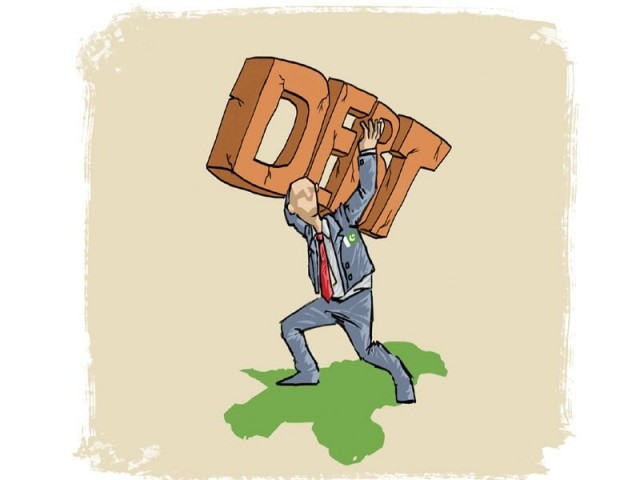No China debt re-profiling on cards
FinMin rules out agreement signing next week for debt rescheduling

Finance Minister Muhammad Aurangzeb on Wednesday ruled out the signing of an energy debt restructuring agreement with China next week and also said that provinces would collect agricultural income tax at new rates from the next fiscal year.
He was speaking to journalists after attending a meeting of the Senate Standing Committee on Finance. Responding to a question, he ruled out any immediate signing of an agreement for the rescheduling of Chinese energy debt.
There were multiple media reports this week that the government was poised to sign a memorandum of understanding (MoU) for energy debt re-profiling during the upcoming visit of Chinese prime minister.
People familiar with Chinese negotiators said that it might be the wish of Pakistan's government but there was nothing concrete at the current stage that could lead to the finalisation of terms of negotiations.
The Chinese were willing to display their intentions for continuing discussions on debt re-profiling, they added.
The finance minister said that at this stage the re-profiling agreement could not be signed due to the fact that it was a long-drawn process and would require the consent of lenders and sponsors.
The prime minister's so-called home-grown economic plan also states that it will take three to four years to complete negotiations on Chinese energy debt restructuring.
Pakistan owes about $16 billion to Chinese financial institutions and desires that the Chinese PM should sign an MoU to "agree to discuss multiple options and chalk out a way forward for debt re-profiling of the project based on win-win for all stakeholders concerned". This does not mean an immediate relief.
During the finance minister's visit to Beijing, Pakistan asked China to consider converting the base currency and base rate of the foreign currency loan, increase the existing loan tenor by another five years, and introduce a three-year principal payment moratorium forthwith.
Aurangzeb said on Tuesday that the Chinese dealing with debt negotiations came under attack in Karachi and two were killed.
However, the Finance Division clarified that the government had been negotiating with the independent power producers (IPPs), including the power plant for which both the Chinese engineers worked. However, the deceased engineers were not involved in IPP talks. Hence, any impression created to this effect by media reports is misleading.
Agricultural income tax
The finance minister said that agricultural income tax would be collected by provinces at new rates from the next fiscal year – 2025-26.
Provinces were required to make legal amendments in their respective agricultural income tax laws by January 1, 2025 and they would collect the tax at new rates from July 1, he said.
The minister's statement about the agricultural income tax indicates the pushback from Sindh and Punjab that are not willing to antagonise their landlord legislators amid heightening political instability.
However, there seems to be some confusion, as the National Fiscal Pact, which has been signed by the four provinces, states that provincial governments shall amend agricultural income tax regimes to fully align them, through necessary legislative changes, with federal personal income tax (small farmers) and corporate (commercial agriculture) tax regimes by the end of October.
The pact states provinces will begin the taxation of agricultural income under the new regime from January 1, 2025, with collection for the second half of FY 2024-25 agricultural incomes in July 2025.
The finance minister's statement implies that the new income tax rates for farmers and landlords will be applied from the next fiscal year.
Federal personal income tax rates are as high as 50% and corporate rates are 29%, excluding the super income tax.
The government already seems to be back-pedaling on its two other major initiatives – taxing retailers and increasing property valuation rates aimed at cumulatively collecting an additional Rs90 billion in this fiscal year. There is no progress on these two initiatives but the salaried class has been heavily penalised.
Chartered accountant Haroon Khawaja on Wednesday made a presentation before the Senate Standing Committee on expanding Pakistan's narrow tax base.
Khawaja, in consultation with renowned tax expert Dr Ikramul Haq, proposed to establish the National Tax Authority. He said that the new authority should comprise professionals appointed on merit and market-based remunerations.
Khawaja stressed that the tax authority should be an autonomous body on the lines of State Bank of Pakistan (SBP) as well as financially independent. In his view, the authority will eliminate multiple agencies dealing in taxes, levies, surcharges and duties.
According to Khawaja and Haq, Pakistan has the potential of bringing 18.9 million taxpayers into the tax net against the existing six million return filers. Capturing the entire potential will help increase income tax collection from this year's projected Rs5.4 trillion to Rs13 trillion in two years.
As a result, in five years, the individual tax rate could be brought down to 10% from 39% and corporate rate could be fixed at a flat 20%, he added. Tax-to-GDP ratio will jump to 15% from the low of 9%. He said that the FBR was inefficient and its officials were involved in massive rent-seeking and as a result the taxpayers ended up paying underhand, even if they were fully compliant.


















COMMENTS
Comments are moderated and generally will be posted if they are on-topic and not abusive.
For more information, please see our Comments FAQ